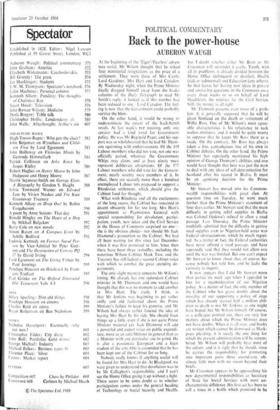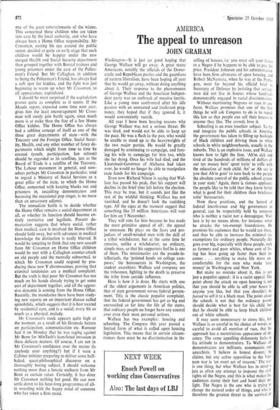Back to the power-house
POLITICAL COMMENTARY AUBERON WAUGH
At the beginning of the 'Tiger'-`Fearless' adven- ture serial, Mr Wilson thought that he risked four ministerial resignations as the price of a settlement. They were those of Mrs Castle. Lord Gardiner, Mrs Hart and Lord Caradon.
By Wednesday night, when the Prime Minister finally dragged himself away from the leader columns of the Daily Telegraph to read Mr Smith's reply, it looked as if this number had been reduced to one---Lord Caradon. The feel- ing is now that the Government could probably survive the blow.
On the other hand, it would be wrong to underestimate the extent of the back-bench revolt. At last week's PLP meeting, only one speaker had a kind word for Government
policy. He was Mr Reginald Paget. and his sup- port was so wholehearted that he had Mr Thom- son squirming with embarrassment. Of the 119 Labour members who did not vote, not one was officially paired, whatever the Government Whips may claim, and at least ninety must represent deliberate abstentions. Of the 177 Labour members who did vote for the Govern- ment, nearly seventy were members of it. In
effect, there are scarcely more than a hundred unemployed Labour MPs prepared to support a Rhodesian settlement, which should give the Cabinet food for thought.
What with Rhodesia and all the excitements of the long recess, the Cabinet has remained in decent obscurity for far too long. Mrs Hart's appointment as Paymistress General with special responsibility for devolution, partici- pation, youth, new ideas and the Civil Service in the House of Commons surprised no one— she is the obvious choice—nor should Mr Jack Diamond's promotion to the Cabinet. We had all been waiting for this since last December when it was first promised to him. Since then there have been three reshuffles, including the notorious Wilson Cabinet Mark Two, and the Treasury has still lacked a second Cabinet voice with which to combat the great spending de- partments.
The only slight mystery concerns Mr Wilson's timing. He already has one redundant Cabinet minister in Mr Thomson, and one would have thought that this was no moment to add another in Mrs Hart. The truth, I think, is that Mr Jenkins was beginning to get rather sniffy and old fashioned about the Prime Minister's failure to keep his promise. and Mr
Wilson had always rather fancied the idea of having Mrs Hart by his side. She should liven things up a little. even if she is not quite Prime Minister material yet. Jack Diamond will add a powerful and expert voice on public expendi- ture, more as an anti-Minister in general than as a Minister with any particular axe to grind. He is also a passionate European and a keen student of the arts. One is astounded that he has been kept out of the Cabinet for so long.
Nobody really knows if anything useful will be found for Mrs Hart to do. At Blackpool, we were given to understand that devolution was to be Mr Callaghan's responsibility, and I can't see the Home Office giving it up without a fight. There seems to be some doubt as to whether participation comes under the general heading of Technology or Social Security and Health, but I doubt whether either Mr Benn or Mr Crossman will surrender it easily. Youth, with all its problems, is already divided between the Home Office (delinquent or derelict), Health (sick or subnormal) and Education (any others).
So that leaves her having new ideas in private and answering questions in the Commons once every three weeks or so on behalf of Lord Shackleton, the minister for the Civil Service. Still, the money is all right.
Mr Thomson presents even more of a prob- lem. It is generally supposed that he will be given Scotland on the death or retirement of Willie Ross. One of Mr Wilson's most agree- able characteristics is his reluctance to sack useless ministers, and it would be quite wrong to suppose that he keeps Mr Ross there as a toady. On the contrary, Mr Ross has always taken a fine, cantankerous line of his own in Cabinet debates. On the other hand, the Prime Minister has repeatedly mentioned his high opinion of George Thomson's abilities, and one would have thought that here was just the man to deal with any ideas of self-determination for Scotland after his record in Biafra. It must be an agonising decision for the Prime Minister.
Mr Stewart has moved into his Common- wealth responsibilities with great élan. At question time on Tuesday, he went much further than the Prime Minister's statement of four days earlier. Mr Stewart said that the main difficulty in getting relief supplies to Biafra was Colonel Ojukwu's refusal to allow a road passage. Last Thursday, the Prime Minister truthfully admitted that the difficulty in getting road supplies even to Nigerian-held areas was Federal obstructionism, which he much regret- ted. As a matter of fact, the Federal authorities have never offered a road passage, and have repeatedly said that they would not allow one until the war was finished. But one can't expect Mr Stewart to know about that, of course, be- cause nobody has told him, and he lacks the curiosity to inquire.
It now appears that I did Mr Stewart more than justice six week ago when I appealed to him for a reconsideration of our Nigerian policy. As a matter of fact, the only member of the Cabinet who has grave doubts about the morality of our supporting a policy of siege which has already starved half a million chil- dren to death is not Mr Jenkins. as one might have hoped, but Mr Wilson himself. Of course, as a colleague pointed out, there are very few matters about which the Prime Minister does not have doubts. When it is all over, and books are written which cannot be dismissed as Mark- press pleading, it is surely the one thing for which the present administration will be remem- bered. Mr Wilson will probably bear most of the odium, and it is right that he should, since he carries the responsibility for promoting into important posts these second-rate, ob- stinate little men with no vision beyond their briefs.
Mr Crossman appears to be approaching his new departmental responsibilities as Secretary of State for Social Services with most un- characteristic diffidence. His first act has been to call a truce in a battle which promised to be one of the great entertainments of the winter. This concerned those children who are taken into care by the local authority, and who have always been a Home Office responsibility. Mr Crossman, casting his eye around the public sector, decided at quite an early stage that such children would be happier under the new merged Health and Social Security department than grouped together with Borstal trainees and young prisoners under the care of the Police- man's Friend. But Mr Callaghan, in addition to being the Policeman's Friend, has always had a soft spot for kiddies, and the fight was just beginning to warm up when Mr Crossman, to all appearances, capitulated.
I should be most surprised if the capitulation proves quite as complete as it seems. If the Maude report, expected some time next year, gives him the least encouragement Mr Cross- man will surely join battle again, since much more is at stake than the fate of a few Home Office kiddies. The Home Office has always had a sublime concept of itself as one of the three great departments of state—with the Treasury and the Foreign Office. Social Secur- ity, Health, and any other number of fancy de- partments which might from time to time be created (youth, participation, law reform) should be regarded as its satellites, just as the Board of Trade is a satellite of the Treasury. The Labour movement in general, and now- adays perhaps Mr Crossman in particular, tend to regard a Ministry of Social Services as a great pillar of the state, to which the Home Office, concerned with keeping blacks out and prisoners in, assaulting demonstrators and harassing the occasional pop singer, is no more than an unsavoury adjunct.
The immediate battle is to decide whether the Home Office remains a social department at all, or whether its function should become en- tirely restrictive and legalistic. Present de- marcation suggests that where social, rather than medical, care is involved the Home Office should hold sway, but with advances in medical knowledge the distinction is easily blurred. It would be tempting to think that any new assault from Mr Crossman on Home Office children would be met with a Callaghan counter-attack on old people and the mentally subnormal, to which Mr Crossman could respond by pro- ducing these new Y chromosomes, proving that criminal tendencies are a medical complaint. But the truth is that poor Mr Crossman has too much on his hands already trying to get some sort of department together, and all the aggres- sive dynamic is coming from the Home Office. Recently, the mandarins there have been study- ing new reports on an important disease called spinobifida, which suggests that it is best treated by residential care, and is a social, every bit as much as a physical, malady.
Mr Crossman's stock appears quite high at the moment, as a result of his Granada lecture on participation, communication etc. Rumour had it on Monday that he was raging against Mr Benn for MinTech's ham-fisted intrusion in these delicate matters. Of course, I am not in Mr Crossman's confidence over the matter (is anybody over anything?) but if I were a Cabinet minister preparing to deliver some half- baked, quasi-philosophical discourse on a thoroughly boring subject, I should welcome nothing more than a lunatic outburst from Mr Benn as curtain raiser. Certainly, it has done Mr Crossman nothing but good. He can now settle down to his hour-long programmes of all- in wrestling with the happy mind of someone who has taken a firm stand.















































 Previous page
Previous page